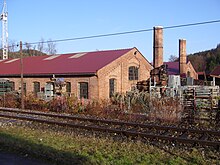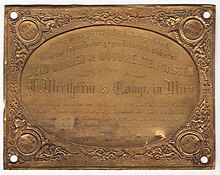Franz von Wertheim

Franz Freiherr von Wertheim (born April 12, 1814 in Krems an der Donau , Lower Austria, † April 3, 1883 in Vienna ) was an Austrian industrialist .
biography

Born in Krems an der Donau on April 12, 1814, the son of a poorly wealthy Jewish merchant family, after years of traveling in Germany , France and England , he began manufacturing tools in Krems in 1841. In 1842 he took over the production facilities of the tool manufacturer Gruber in Vienna and Neustift near Scheibbs (Eisenwurzen region), which he completely redesigned and doubled the number of workers. At that time, the region was a stronghold of the iron and steel processing industry, Wertheim was located in the immediate vicinity of Europe's largest and most modern rolling mills owned by Andreas Töpper .
In 1844 Wertheim won a silver medal at an industrial exhibition in Laibach. In the following year he received the title of kk court tool manufacturer when Emperor Ferdinand I bought his award-winning tool collection for the polytechnic institute in Vienna.
After moving to Vienna in 1846, Wertheim produced a large collection of tools for the technical cabinet of Emperor Ferdinand. Another collection of 885 tools was commissioned by the Imperial Museum in St. Petersburg.
In the following years, Wertheim perfected its production and repeatedly won prizes and medals at exhibitions, e.g. B. the world exhibition of 1851 in London .
After breaking into his office in 1848, Wertheim wanted to manufacture burglar-proof and fireproof cash registers. He also acquired a patent for production at the world exhibition. The public fire test of one of his safes in Constantinople in Constantinople in 1857 caused a sensation. It was carried out in the presence of the sultan and various celebrities. The safe was exposed to the flames at high temperatures for hours, but the securities and money stored there were not damaged. 3,000 cash safes were manufactured for Constantinople alone.
In 1852 Wertheim, together with Friedrich Wiese, founded a company in Vienna for the production of “fireproof, burglar-proof cash, book and document coffers” and settled with 80 locksmiths on the grounds of a former Erdberger candle factory.
Wertheim began building fireproof and burglar-proof cash registers in 1852 and armored steel cash registers in 1876, thus establishing the reputation of the "Wertheim cash registers". In 1869 the production of the 20,000 cash register was celebrated with a big party. On the occasion of this celebration, Josef Strauss composed the famous Polka Feuerfest . At this festival he also offered an amount of one hundred thousand francs as a price for anyone who succeeded in opening a Wertheim cash register.
In 1863 Heinrich von Ferstel designed the Wertheim Palace in Vienna for him (corner of Ringstrasse and Schwarzenbergplatz). In 1867 Wertheim took part in the world exhibition in Paris with a large sample of tools. He played a key figure in the 1873 Vienna World Exhibition . He also campaigned for the appointment of Wilhelm Freiherr von Schwarz-Senborn as general director of the exhibition. As an exhibitor, his products were present in the rotunda and in the industrial hall.
He was held in high esteem by the crowd and at court. In 1869 he was allowed to accompany Emperor Franz Joseph I to the opening of the Suez Canal as his personal industrial expert. In addition, Wertheim was from 1869 to 1871 a member of the Lower Austrian Parliament , Vienna City Council, Vice-President of the Vienna Chamber of Commerce, President of the Lower Austrian Trade Association and curator of the Austrian Museum for Art and Industry.

Wertheim was a personality who made her service available to the entire Austrian industry. There were no "worker problems" in his company, he always emphasized that his ideas could not be implemented without his employees. He was considered a pioneer of the "modern advertising". Anything and everything was fine with him, as long as it drew the attention of the environment to him and his products. He also promoted the arts through well-paid commissions and built a small theater in his palace in 1872.
In 1871 Wertheim was raised to hereditary nobility. He was also the holder of the following medals: Commander of the Franz Joseph Order , Officer of the French Legion of Honor , Officer of the Ottoman Medjidie Order, etc. Wertheim held positions as Vice President of the Chamber of Commerce , City Council of Vienna , honorary citizen of Krems , Scheibbs and Steyr . In his honor there is still Wertheimgasse in Neustift today. His company Wertheim GmbH still produces safes, safes and banking equipment to this day.
In addition to the collections already mentioned, there are other tools by Franz Wertheim in the Paris Conservatoire National des Arts et Métiers, in Nuremberg, Meiningen, Turin and Athens. A collection was also included in the Kensington Museum, for which Wertheim created its own catalog, which was also published in French.
literature
- Constantin von Wurzbach : Wertheim, Franz Freiherr von . In: Biographisches Lexikon des Kaiserthums Oesterreich . 55th part. Kaiserlich-Königliche Hof- und Staatsdruckerei, Vienna 1887, pp. 108–113 ( digitized version ).
- Ingrid Haslinger. Customer - Kaiser. The story of the former imperial and royal purveyors . Schroll, Vienna (1996). ISBN 3-85202-129-4
- Hans Frühwirth: Your love was for Krems. Cultural Office of the City of Krems, Krems 1997, ISBN 3-901664-01-9 .
- János Kalmár, Mella Waldstein: KuK purveyors to Vienna's court . Stocker, Graz 2001, ISBN 3-7020-0935-3 . Pp. 90-93.
- Biographical data of Franz von Wertheim . In: Niederösterreichische Landtagdirektion (Hrsg.): Biographisches Handbuch des NÖ Landtag: 1861–1921. Lower Austria Landtag Directorate, St. Pölten, print: ISBN 3-85006-166-3 (as of January 1, 2005). Online version: PDF, 843 kB
Web links
- Wertheim, Franz Freiherr von . In Constantin von Wurzbach Biographisches Lexikon des Kaiserthums Oesterreich , Volume 55, Vienna 1887
- Wertheim, Franz Freiherr von, Manuel de l'outillage des arts et métiers: à l'usage des écoles techniques, compagnies de chemins de fer et de navigation: traitant de l'outillage du menuisier, tourneur, tonnelier, charron, charpentier, modeleur et du mécanicien , Vienne: Charles Gerold fils, libraire-éditeur, 1869
- Entry on Franz von Wertheim in the Austria Forum (in the AEIOU Austria Lexicon )
- Franz von Wertheim's tomb at the central cemetery - viennatouristguide.at
Individual evidence
- ↑ www.juden-in-st-poelten.at pdf
- ^ Vienna-Schwarzenbergplatz
- ^ Jutta Pemsel: The Vienna World Exhibition of 1873: The Wilhelminian Vienna at the turning point. Vienna / Cologne, Böhlau Verlag 1989, p. 56f, ISBN 3-205-05247-1
- ^ Biographical data from Franz von Wertheim . In: Niederösterreichische Landtagdirektion (Hrsg.): Biographisches Handbuch des NÖ Landtag: 1861–1921. Lower Austria Landtag Directorate, St. Pölten, print: ISBN 3-85006-166-3 (as of January 1, 2005). Online version: PDF, 843 kB
| personal data | |
|---|---|
| SURNAME | Wertheim, Franz von |
| ALTERNATIVE NAMES | Wertheim, Franz Freiherr von (full name) |
| BRIEF DESCRIPTION | Austrian industrialist and politician, member of the state parliament |
| DATE OF BIRTH | April 12, 1814 |
| PLACE OF BIRTH | Krems an der Donau , Lower Austria |
| DATE OF DEATH | April 3, 1883 |
| Place of death | Vienna |


